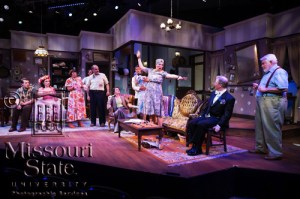I’m just going to go ahead and make a grumpy sounding statement here that might make some of you shake your head, but then I’m going to explain why I feel this way, and maybe some of you will agree with me on this:
I think the Film, Television, and music industries have neutered community talent.
How? Well, by placing a few really-well-paid stars in the sky (stars whose light shine all over the world at all hours of the day/night), it’s altered our ability to perceive, appreciate, and develop local talent.
Let me back up.
Before entertainment was mass-marketed to every corner of the globe, local artists were oftentimes average and hard-working people who made theatre or wrote poems or played the piano on the side. I’m sure a lot of those people dreamed about what it would be like to be able to quit their full time jobs and take their talents on the road – and many an early artist did just that. But their measure for talent was a local one. They were the “Best in town” or the “Best on their block” and they weren’t comparing themselves to a few celebrities living glamorous lifestyles far, far away…
Nowadays, however, pre-packaged entertainment is piped in and available everywhere. Talent shows are held in which the judges mimic Simon Cowell and compare competitors to people like Adelle, even though the competitors are 35 year-old SAHMs who’ve never had a singing lesson in their life.
And theatre audiences are shrinking because why go see your Aunt Sally in a community theatre production of Streetcar when you can see Interstellar on the IMAX in 3-D?
Do you see where I’m going with this? Our local enthusiasm and gusto for local artists is in direct competition with the incredibly alluring and pre-approved “Celebrity”, and that puts us in a super awkward position as artists.
And none of this is new ground – the Arts are very much aware of the fight for audiences in today’s mass-market, but I’m not talking about audiences here… I’m talking about us. And I can’t help but wonder what more we can do on an individual level as artists to strengthen and celebrate the arts on smaller, more local scales.
What can we do to help nurture local talent, just as your local chamber of commerce supports local businesses?
So I’ll just ask: When is the last time you went to a show at your local community theatre and didn’t spend the drive home comparing it to professional shows you’ve seen? When’s the last time you sat in a room full of part-time writers who write with unbridled (and probably untrained) passions and celebrated them without comparing their work or their intentions to that of the “professionals”?
For some of you, the answer will be “Last week, cranky-pants!” but for some of you, I bet the answer is “Ummmmmm…. let me think….” because as artists and writers who are pursuing our dream, I think it’s only natural that some of us get so caught up in the path we are pursuing that we: A – forget that “passion” and “profession” shouldn’t necessarily be judged side-by-side, and B – that in remembering to celebrate the small, joyful, local moments of artistry, we are doubling down on the meaning of art as a form of self-expression, rather than as an act of commerce.
So what does this have to do with being a female playwright?
Well, I think it comes down to staying connected with your community, even as you write in pursuit of NY, Chicago, or LA. We can’t expect audiences to demand theaters perform our work if we’re not out there supporting them right back! Also, I don’t live in NY, Chicago, or LA, so if I make those target cities my sole focus and don’t engage with the community in which I actually live, aren’t I being grossly self-obsessed and foolhardy?
So I attend community theatre, I go to college shows, I attend youth scholarship events when I can, and I work at staying connected to the arts scene back home that has supported me so very, very much – because I believe in them too!
And perhaps this is a long, twisting post about tired topics, but I do hope that it creates within you a reflective “How can I get more involved with local artists?” because as artists ourselves, we need to continue to challenge ourselves to learn and grow, while also giving back and engaging with the very communities we hope to someday entertain and challenge with our written work.
Because art is not only art when called so by a critic, right? Art can be found anywhere and comes in all shapes and sizes and forms. And the accessibility of it is every bit as important as those de rigour moments of small audience “brilliance” some artists achieve. Just look at this video of a musician who has figured out how to turn a carrot into a clarinet. Watch it all the way through – that’s art, people! It’s amazing – and it’s not a super expensive, hard to come by instrument he’s playing, it’s a mother f***ing carrot! Talk about local… he doesn’t have to go farther than his local grocery store to create music. He’s engaged in creating unique and accessible opportunities, and in so doing he’s created some genuine theatre magic!
And that’s something to celebrate.
~Tiffany











